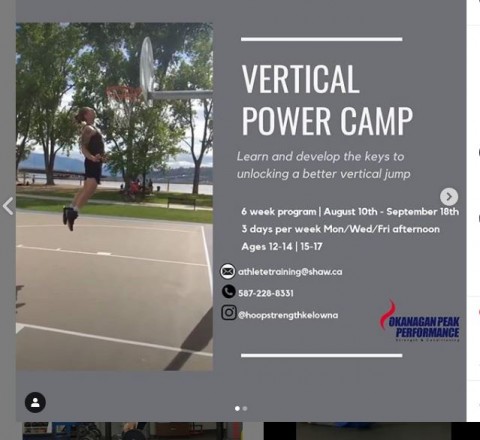Full disclosure...I'm not a very good leaper. I was a swimmer for most of my athletic career. I also played a little basketball and volleyball. And while jumping is a key aspect of most sports it wasn't my forte. Even later in training I was never the best at box jumps. I remember a friend, Chris Lebihan, coming in to the gym one day to train. And the plyo boxes were stacked totalling 54" tall or 4 feet 6 inches. Anyways, a number of young athletes were training. And one of them commented that jumping that high just wasn't possible. Lebs had just walked in the gym in street clothes with his gym bag slung over his shoulder. I called to him and asked him to jump up on the boxes. He dropped his bag off his shoulder and proceeded to jump atop the boxes with ease. He picked up his bag and carried on to the change-room. The young athletes were stunned and speechless. Now to be fair it didn't hurt that Lebs was an Olympic medallist in a power sport i.e. bobsleigh. And it definitely made a huge impact on those young athletes. So besides impressing people in the gym what else is jumping good for? Well, it's an important quality in many team sports. The striker in soccer may need to get up on a corner to head the ball in for a goal. In football, a receiver may need to out jump the defense on a last play Hail Mary. Basketball and volleyball involve constant jumping on every play from a lay up, a dunk or a rebound in the former to a serve, a hit or a block in the latter. When you think about it the highlight plays of most sports involve jumping. This could...
What and How You Say It Matters
- Chris Collins
- Fitness
- 1612 Hits
- 0 Comments
-
I remember growing up and my parents would spell things out to each other when they didn't want my siblings and I to understand what they were talking about. And now I find Alexandra and I doing the same thing.For example, on the weekend we were planning out our day and I asked Alexandra if I should take Olivia and go for a s-k-i? And if we don't go to the hill I might suggest that we all go for a s-w-i-m.Because the thing is as soon as you mention anything along the lines of going skiing or to the pool you've basically promised them to go and do that activity. And if you don't deliver tears ensue. Usually on my part first and the kids follow suit shortly after.But the whole point of this is that what and how you say something matters. The same applies to coaching as well.Let's take a moment to look at what you say and how to say it when coaching.What You SayHave you ever travelled to a foreign country and there is a North American tourist trying to communicate to someone in English? The North American is typically looking for directions and the local person doesn't speak English. Instead of looking for someone to translate, or using hand gestures or a different approach, the tourist simply speaks louder and slower.[caption id="attachment_5441" align="aligncenter" width="300"] Tourists sometimes think speaking louder and more slowly leads to comprehension.It's as though the breakdown in communication is a result of a hearing difficulty or auditory processing.We've all seen and been embarrassed by one of our own countrymen, or relatives, acting in this way.Coaching is similar.When we are looking to convey feedback to a client it makes no sense to speak Greek to an English speaker. Or in the case of anatomy,...
Slowing Down Training
- Chris Collins
- Fitness
- Training
- Injury Prevention
- 1592 Hits
- 2 Comments
-
'Train slow - Best slow' Have you heard this saying before? I want to give credit to legendary strength & conditioning coach Al Vermeil as he's been known to have a number of original saying related to training. Another one I know for sure Al said was related to plyos where he said 'the bigger the athlete the smaller the hurdle' (or box). But back to the original statement this has to do with the specificity of training. If you are an athlete that requires speed it is important to use movement, drills and exercises that develop the capacity of the athlete to move and perform at a high velocity. And typically what happens is people watch YouTube videos of people performing insanely high box jumps or their favourite athlete is featured in a commercial doing something explosive. All of a sudden everyone wants to start there. Day 1 and they want to do max height box jumps, plyos, Olympic lifts and anything else that is worthy of a facebook post. Let's face it there aren't too many 'likes' for someone being able to hold a proper plank for 60 seconds. So do we really have to 'go big or go home'? Is there value to slowing things down a bit? Can you still achieve your potential without going all out all the time? The answer to all of these is No-Yes-Yes. In particular there are a couple of times when slower is better. In particular when you are performing stability or balance drills there is more benefit to slowing things down. Consider the following couple of scenarios. Slowing Down Plyometrics An athlete could be performing Heidens, bounding from one leg to the other. This is a great drill to develop power in the frontal plane. When this drill is performed with...

